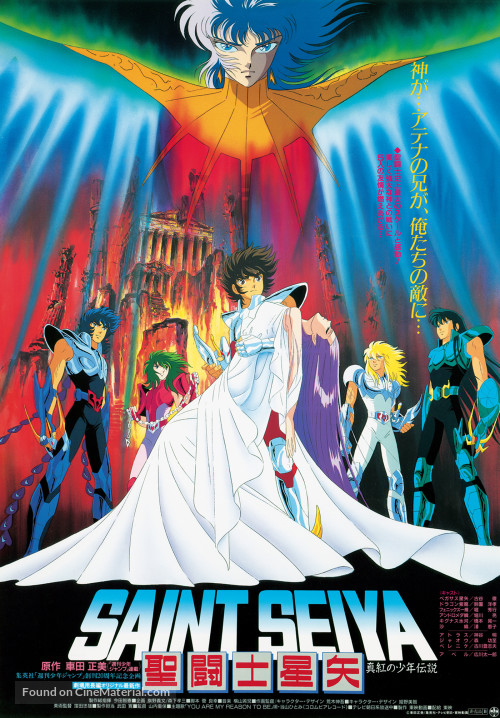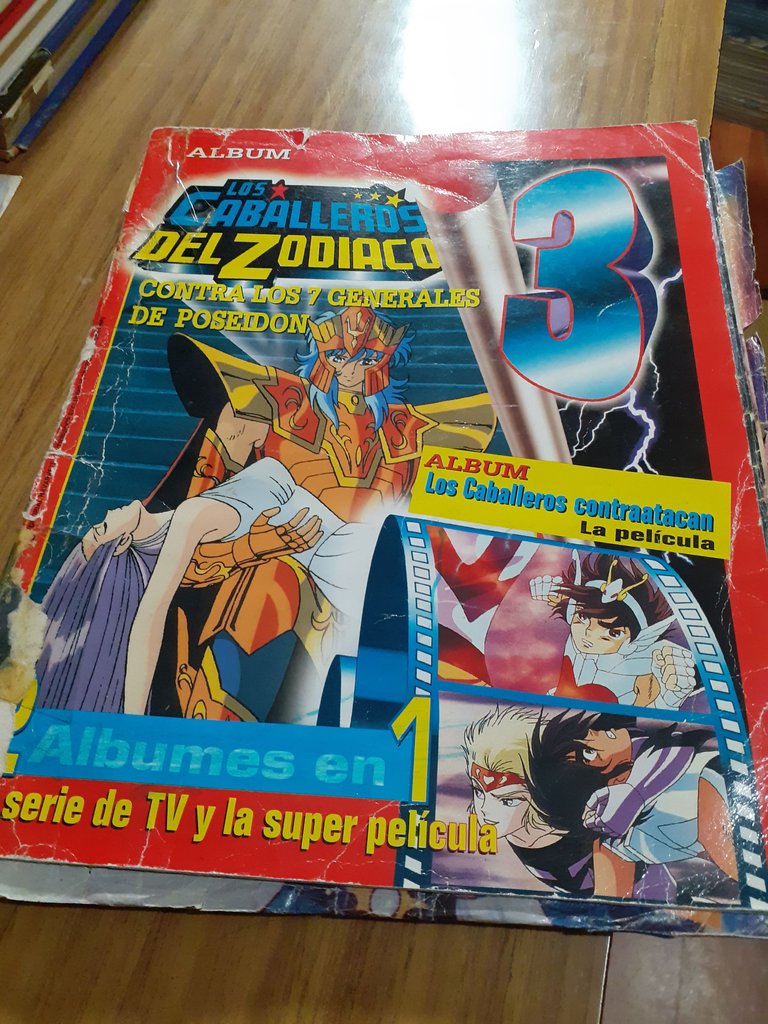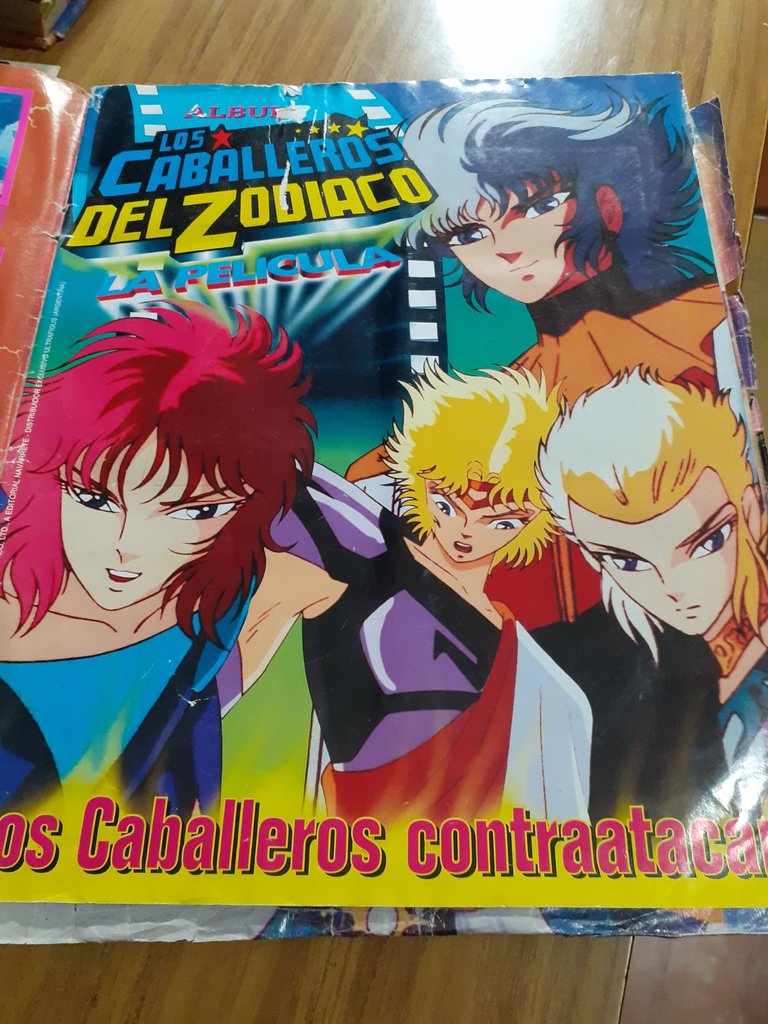CineTV Contest: #75: Saint Seiya: Legend of Crimson Youth / Saint Seiya: La leyenda de la juventud escarlata
Cine TV CONTEST:
https://peakd.com/hive-121744/@cinetv/cinetv-contest-75-favorite-anime-movie-or-television-show
The Legend of the Scarlet Youth (also translated slightly different) is the most exciting and emotional movie I saw and that not even previous spoilers could diminish.

I already had the spoilers for the original Latin American opening with which the series was initially released, which had, among others, images from that movie, although I didn't know then where those images were from.
I had also already read the story of the movie in a figurine album, I think from my brother.


And I also saw it first, partially, on a local channel that came weakly, with "rain" to my television.
But, finally, a school friend lent me the film on VHS and I finally got to see it in its entirety and in good quality, and it was sublime, awestrucking. For two or three weeks I watched it once every time I came home from school, and then I watched it many more times as well, to the point that I memorized the dialogue of the entire movie almost to perfection (although I don't think I could repeat it now).
Curiously, this movie is one of the cases in which a dubbing different from the original of the series was better, and it was also made with a kind of echo effect that looked very good; and although it was later re-dubbed with the voice dubbers of the series, I recommend watching it with this first dubbing (for Latinamerica).
The film takes place after the saga of the twelve houses of the series. It begins with the immediate presentation of the antagonist in front of Athena: Abel, the Sun god, and both are very happy to see each other and enjoy spending time together after this reunion that was not given since the mythological era, but this changes when Abel reveals to Athena that his mission there is to execute the divine judgment of the gods on Earth: the destruction of the corrupt humanity.
Just then Seiya, Shiryu, Hyoga, and Shun appear (Ikki will appear later to save Shun as in all the movies), who are surprised by the presence of Abel and his three knights, and even more by that of the golden knights who had died in the battle of the twelve houses, who had been resurrected by Abel; and even more, devastatingly, when Athena announces to them that she no longer needs them and that she is going to live with her brother Abel.
But that was Athena's deception: she had decided to stop her brother by force to protect the Earth and did not want her knights to risk facing such a powerful God. However, Abel overpowers her and, truly saddened, "kills" her, which is perceived by the knights, who then go out to assault Abel's temple.
Is it permissible to fight against a god? To rebel in the face of divine judgment?
The film would seem, thus, to simply follow the same kind of plot as the previous two and the series, but it is its supreme realization that makes it stand out. A sublime score, by Seiji Yokoyama, the same composer of the series, accompanies almost every minute of the film, and should be seen by musicians and sound engineers who want to learn how to score scenes; some of the pieces would later be used in the series, with perhaps the most important being Deukalion's Big Floods.
The battles between knights are very fluid, not too long but quite short, and very intense. The animation is excellent throughout the whole movie, about an hour ten long, and what I find the best scene of all Saint Seiya, canon or not canon, is here: the four minutes, and a little more too, when Deukalion's Big Floods plays, which is when everything seems lost, but the same piece has a change of tone in the middle, synchronized with the moment when Seiya's cosmo, still on the floor, turns golden...
And, most importantly for Saint Seiya: both the high valuing of friendship and the "miracle effect" so characteristic of this shonen (achieving the seemingly impossible with the power of will and determination) are displayed as never before here, where Seiya, repeating Saga of Gemini, defines: "The infinite cosmo and the seven senses can only be achieved by someone who has the strength and hope to fight to the end. It doesn't matter that our bodies are undone, our cosmo is immortal".
All this strengthened because it is a God before whom they face, and a very imposing one at that, similar to how Apollo will be imposing in the future film Heaven's Overture, but who is surprised at Seiya's tenacity: "Pegasus' cosmo has risen to infinity. I hope you don't think you can surpass my cosmo. That would be madness. Don't be foolish. Don't be irreverent. You think you can surpass a god? What I don't understand is why I feel fear."
A wonderful movie, the spirit of Saint Seiya's work displayed to the fullest.
La leyenda de la juventud escarlata (también traducida ligeramente diferente) es la película más emocionante y emotiva que vi y que ni espoilers previos pudieron disminuir.

Ya tenía los espoilers del opening original para latinoamérica con que había salido la serie inicialmente, que tenía, entre otras, imágenes de esa película, aunque no sabía entonces de dónde eran esas imágenes.
También ya había leído la historia de la película en un álbum de figuritas, creo que de mi hermano.


Y también la vi primero, parcialmente, en un canal local que llegaba débilmente, con “lluvia” a mi televisión.
Pero, finalmente, un amigo de la escuela me prestó la película en VHS y finalmente pude verla entera y con buena calidad, y fue sublime, “awestrucking”. Por dos o tres semanas la vi una vez cada vez que regresaba a mi casa de la escuela, y luego la vi muchas veces más también, hasta el punto de que memoricé los diálogos de toda la película casi a la perfección (aunque no creo que pudiera repetirlos ahora).
Curiosamente, esta película es uno de los casos en que un doblaje distinto al original de la serie quedó mejor, y además fue hecho con una especie de efecto de eco que quedó muy bien; y aunque luego fue redoblada con los dobladores de voz de la serie, recomiendo verla con este primer doblaje.
La película transcurre después de la saga de las doce casas de la serie. Comienza con la presentación inmediata del antagonista frente a Atena: Abel, el dios Sol, y ambos están muy contentos de verse y disfrutan pasar el tiempo juntos tras este reencuentro que no se daba desde la era mitológica, pero esto cambia cuando Abel le revela a Atena que su misión allí es ejecutar el juicio divino de los dioses sobre la Tierra: la destrucción de la corrupta humanidad.
Justo entonces aparecen Seiya, Shiryu, Hyoga, y Shun (Ikki aparecerá más tarde para salvar a Shun como en todas las películas), que se sorprenden ante la presencia de Abel y sus tres caballeros, y aun más por la de los caballeros dorados que habían muerto en la batalla de las doce casas, que habían sido resucitados por Abel; y aun más, devastadoramente, cuando Atena les anuncia que ya no los necesita y que se va a vivir con su hermano Abel.
Pero eso fue un engaño de Atena: había decidido detener a su hermano por la fuerza para proteger a la Tierra y no quería que los caballeros se arriesgaran a enfrentarse a un Dios tan poderoso. Sin embargo, Abel la sobrepasa y, verdaderamente entristecido, la “mata”, lo que es percibido por los caballeros, que entonces salen al asalto del templo de Abel.
¿Estará permitido pelear contra un Dios? ¿Rebelarse ante el juicio divino?
La película parecería, así, simplemente seguir el mismo tipo de argumento de las dos previas y de la serie, pero es su realización suprema lo que la destaca. Una música sublime, de Seiji Yokoyama, mismo compositor de la serie, acompaña casi todos los minutos de la película, y debería ser vista por los músicos e ingenieros de sonido que quieran aprender cómo musicalizar escenas; algunas de las piezas serían usadas luego en la serie, siendo tal vez la más importante Deukalion’s Big Floods
Las batallas entre caballeros son muy fluidas, no muy largas sino bastante cortas, y muy intensas. La animación es excelente toda la película, de una hora diez de duración, y la que me resulta la mejor escena de todo Saint Seiya, canon o no canon, está aquí: los cuatro minutos, y un poco más también, en que suena Deukalion’s Big Floods, que es cuando todo parece perdido, pero la misma pieza tiene un cambio a la mitad, sincronizada con el momento cuando el cosmo de Seiya, todavía en el piso, se vuelve dorado...
Y, lo más importante para Saint Seiya: tanto la alta valorización de la amistad como el “efecto milagro” tan característico de este shonen (lograr lo aparentemente imposible con el poder de la voluntad y determinación) se despliegan como nunca aquí, donde Seiya, repitiendo a Saga de Géminis, define: “El cosmo infinito y los siete sentidos sólo pueden logrados por alguien que tenga la fuerza y la esperanza para pelear hasta el fin. No importa que nuestros cuerpos estén deshechos, nuestro cosmo es inmortal”.
Todo esto fortalecido porque es un Dios ante quien se enfrentan, y uno muy imponente, similarmente a como Apolo será imponente en la futura película Obertura del Cielo, pero quien se sorprende ante la tenacidad de Seiya: “El cosmo de Pegaso se ha elevado hasta el infinito. Espero que no pienses que puedes sobrepasar mi cosmo. Eso sería una locura. No seas tonto. No seas irreverente. ¿Crees que puedes superar a un Dios? Lo que no entiendo es por qué siento miedo”.
Una película maravillosa, el espíritu de la obra Saint Seiya desplegado al máximo.